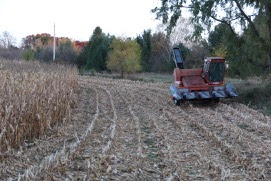Much of this state’s economy depends on the state’s natural assets, including healthy agricultural soils, forests, scenic landscapes, clean water, and wild spaces. These natural assets provide resources and recreation opportunities, and they are also key to residents’ cultural identity and heritage.We believe it does, and yet, two of Minnesota's representatives have successfully added an amendment to "defund a proposed U.S. Forest Service study of all mining near the Boundary Waters Canoe Area Wilderness." Interestingly, two other members of Minnesota's delegation oppose the amendment.
 |
| would nonferrous mining harm tourism based on clean water and wilderness?
Photo by J. Harrington
|
We don't believe there is any justification for substituting political judgement for scientific evidence when it comes to protecting those sectors of Minnesota's economy that depend on the state's natural assets. We firmly believe that such substitutions, carried out over many past years, directly contribute to the need for efforts such as Governor Dayton's initiative to try to improve the state's water quality by 25% by 2025. Is it possible that taking political shortcuts in the past are a large part of why there's a major split in Who’s winning and losing in Minnesota’s 2016 economy?
Agriculture has been almost entirely exempt from compliance with water quality standards that most other sectors of the economy have to meet. Several major taconite mining activities have not had updated water discharge permits for decades. And yet, both Mining and Agriculture are in the "Losing" category in Minnesota's 2016 economy. Shortchanging Minnesotans' natural assets doesn't seem to have helped much.
 |
| is more yield, and more subsidy, for corn and soybeans the answer?
Photo by J. Harrington
|
The description at the start of this posting is specifically about Vermont. Vermonters had become sufficiently dissatisfied with who were the winners and losers in their old economy that they've started to build a New Economy. They've recognized that extractive economies, largely controlled by outside, non-native investors, isn't the path to take for the quality of life they desire. A quality that, among other things, focuses on "Strengthening a healthy middle class—one that can send its children to college and spend and invest locally—is a top priority of New Economy leaders in Vermont."
We moved to Minnesota about 40 or so years ago. Since that time, we've seen our adopted state loose much of its social and cultural coherence. It seems to have followed roughly along the lines of Democracy in Chains, although perhaps not as radically. But, according to the Star Tribune, when it comes to spending on education:
“We have been middle of the pack for quite some time,” Scott Croonquist, executive director of the Association of Metropolitan School Districts, said. “The perception that we are one of the higher ranked states is an artifact of a bygone era.”
In the New Economy, not only spending on education, but both the form and the residence of asset ownership matters. Is it time for a conversation about who owns Minnesota? That's not intended as a rhetorical question. It would be part of the foundation on which Minnesotans can build a New Economy that makes winners out of farmers, miners and urban folks rather than a small percentage (1% or so) getting ahead by beggaring their neighbors or everyone's environment.An artifact of the ‘70s, Croonquist said, during the “Minnesota Miracle” when then-Governor Wendell Anderson and policymakers made a conscious decision to invest in education and reduce education disparities.
Economy
After you’ve surrendered to pillows and I, that second whiskey, on the way to bed I trace my fingers over a thermostat we dare not turn up. You have stolen what we call the green thing— too thick to be a blanket, too soft to be a rug— turned away, mid-dream. Yet your legs still reach for my legs, folding them quick to your accumulated heat. These days only a word can earn overtime. Economy: once a net, now a handful of holes. Economy: what a man moves with when, even in sleep, he is trying to save all there is left to save.
********************************************
Thanks for visiting. Come again when you can.
Please be kind to each other while you can.
No comments:
Post a Comment